BKMT READING GUIDES
If a Lion Could Talk: Animal Intelligence and the Evolution of Consciousness
by Stephen Budiansky
Hardcover : 256 pages
0 club reading this now
0 members have read this book
How many of us have caught ourselves gazing into the eyes of a pet, wondering what thoughts lie behind those eyes? Or fallen into an argument over which is smarter, the dog or the cat? Scientists have conducted elaborate experiments trying to ascertain whether animals from chimps to ...
Introduction
(
How many of us have caught ourselves gazing into the eyes of a pet, wondering what thoughts lie behind those eyes? Or fallen into an argument over which is smarter, the dog or the cat? Scientists have conducted elaborate experiments trying to ascertain whether animals from chimps to pigeons can communicate, count, reason, or even lie. So does science tell us what we assume -- that animals are pretty much like us, only not as smart? Simply, no. Now, in this superb book, Stephen Budiansky poses the fundamental question: "What is intelligence?" His answer takes us on the ultimate wildlife adventure to animal consciousness.
Budiansky begins by exposing our tendency to see ourselves in animals. Our anthropomorphism allows us to perceive intelligence only in behavior that mimics our own. This prejudice, he argues, betrays a lack of imagination. Each species is so specialized that most of their abilities are simply not comparable. At the mercy of our anthropomorphic tendencies, we continue to puzzle over pointless issues like whether a wing or an arm is better, or whether night vision is better than day vision, rather than discovering the real world of a winged nighthawk, a thoroughbred horse, or an African lion. Budiansky investigates the sometimes bizarre research behind animal intelligence experiments: from horses who can count or ace history quizzes, and primates who seem fluent in sign language, to rats who seem to have become self-aware, he reveals that often these animals are responding to our tiny unconscious cues. And, while critically discussing scientists' interpretations of animal intelligence, he is able to lay out their discoveries in terms of what we know about ourselves. For instance, by putting you in the minds of dogs or bees who travel by dead reckoning, he demonstrates that this is also how you find your way down a familiar street with almost no conscious awareness of your navigation system.
Modern cognitive science and the new science of evolutionary ecology are beginning to show that thinking in animals is tremendously complex and wonderful in its variety. A pigeon's ability to find its way home from almost anywhere has little to do with comparative intelligence; rather it is due to the pigeon's very different perception of the world. That's why, as Wittgenstein said, "If a lion could talk, we would not understand him." In this fascinating book, Budiansky frees us from the shackles of our ideas about the natural world, and opens a window to the astounding worlds of the animals that surround us.
What is your cat thinking when she scratches at the door? What goes through Koko the gorilla's mind when she signs? For that matter, what goes through our minds when we think about animals and intelligence? Science writer Stephen Budiansky explores the difficulties of comparing intelligence between species in If a Lion Could Talk and takes a strong stance against measuring other animals using human standards. (The title is part of a Wittgenstein quote that ends "...we would not understand him.")
The book shows how the most basic principle of evolution--that all living things are related--has been misconstrued by well-meaning scientists to imply that all animals possess intelligence that differs from ours only in quantity. This leads to comparisons of near-equivalence between such intuitively likely pairs as adult gorillas and human children, comparisons that Budiansky suggests are misleading and more descriptive of our own minds than those of our distant cousins. What evolution should be telling us, he says, is that each species is equally well suited to its niche and should be examined for what it is, not how similar or different it is from us. How is it that chimpanzees can perform such remarkable problem-solving without language?
If a Lion Could Talk will not make anyone lose interest in animal minds, for that is not its intention. If anything, it inspires a real sense of admiration for the billions of living things that make it through each day despite the seemingly terrible handicap of not being human. Budiansky tells us that if we want to learn about our planet-mates, we have a lot of unlearning to do. Luckily for us he is gracious enough to provide an introductory unlesson. --Rob Lightner
Discussion Questions
No discussion questions at this time.Book Club Recommendations
Recommended to book clubs by 0 of 0 members.
Book Club HQ to over 90,000+ book clubs and ready to welcome yours.
Get free weekly updates on top club picks, book giveaways, author events and more








